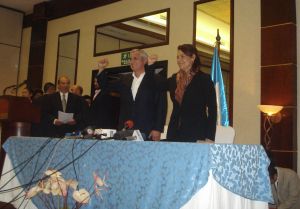GUATEMALA: Women Pin Hopes on First-Ever Female Vice President

Women's rights groups are pinning their hopes on Roxana Baldetti, the first woman to be elected vice president of Guatemala, to boost the chances of increased female participation in politics.
President-elect Otto Pérez Molina, a retired general, and the 49-year-old Baldetti, both of the rightwing Patriotic Party, will be sworn in Jan. 14.
'We hope she will perform well, so that in future we may look forward to having a woman president,' Miriam Ordóñez, the mayor of San Cristóbal Acasaguastlán, 100 km northeast of the capital, told IPS.
'She is facing a great challenge: to give women a good name so that we are not constantly dismissed as we are today, and I am confident that she is well qualified to succeed,' the mayor said.
Only seven of the country's 333 mayors are women, and the same number have been elected for the 2012-2016 period.
And women currently hold just 18 of the 158 seats in the single-chamber Congress, a number that will only rise to 19 (12 percent) for the next four-year term. Of these, only four are indigenous women.
According to official statistics, 40 percent of Guatemala's population of 14 million is made up of indigenous people, although native organisations put the proportion at 60 percent.
Women have won barely 5.5 percent of elected positions - only 27 out of 493 possible posts, including those of president, vice president, mayors, legislators and town councillors, according to a report by the Office of the Human Rights Ombudsman on the 2011 elections.
'Positions in public office are very unequally distributed, an injustice in any representative and participative democratic system,' adds the study, which is based on the results provided by the Supreme Electoral Tribunal.
Expectations thus abound in regard to the role the vice president-elect will play in promoting women's advancement in different spheres, including education.
'Many women have not had the opportunity to get an education, and that limits both their knowledge and their self-esteem, so it is important to work on this issue as well as others, in partnership with women's organisations,' said mayor Ordóñez.
Women also need projects that support them in productive activities, to boost their incomes and improve their quality of life, 'but without party political interests being involved,' Hortencia Simón, an indigenous activist with the Political Association of Maya Women (MOLOJ), a local NGO, told IPS.
The outgoing government of social democratic President Álvaro Colom instituted 'Mi Familia Progresa' (My Family Progresses), a programme that provides around 37 dollars a month to families living in poverty, on condition that their children attend school and receive regular health checkups at state medical facilities.
The programme has been recognised as a success in the fight against poverty, but it has also been criticised by civil society groups, who allege that there is a lack of oversight and that it has been used for political ends.
Simón also said education of girls and women in Guatemala 'is essential, so that they have a chance at decent employment, since certain academic qualifications are required to get a decent job.'
Education of girls and women in this impoverished Central American country is still a great challenge, especially in the case of indigenous women.
Only one in 10 indigenous teenage girls is enrolled in secondary school, and among those who live in extreme poverty, the figure is one in 100, according to a 2007 World Bank study.
The activist said that Baldetti 'will have the opportunity to open or close the doors to political participation for other women, because her performance will show what women can do.'
But Rosario Escobedo, an activist with Sector de Mujeres (Women's Sector), another NGO, was more sceptical with regard to Baldetti.
'We're a bit worried that she won't take our proposals seriously, because she did not give us a clear response when we presented our strategic women's agenda to her, when she was a candidate,' she told IPS.
Sector de Mujeres is promoting a 'national policy for the advancement and integral development of women 2008-2023', and an equal opportunities plan, aimed at guiding the economic, political, social and cultural affairs of the state towards the promotion and development of Guatemalan women, on the basis of equality.
The organisation is also closely watching the selection process for the new presidential secretariat for women's affairs, a key institution for the promotion of public policies benefiting women.
Cecilia Álvarez of the Guatemalan Women's Group, which assists victims of violence, told IPS that 'a woman winning the vice presidency for the first time is an important advance in terms of access to power.'
She added that 'the truth of Baldetti's campaign promises will be put to the test after Jan. 14.'
However, 'Baldetti has made a commitment to some women's organisations to build on the processes that women's groups have initiated. You can't go back to square one when some progress has been made, however limited, for instance on a public policy for integral development of women, and a law against femicide (gender-based murders of women),' Álvarez said.
The vice president-elect has repeatedly said she will support educational, health and productive projects for women in rural areas, which she calls 'the other Guatemala.'
She has stated that 'The duty that falls to me is to do a good job so that more women can go into politics, but above all so that women are taken into account in this country's important decisions.'
© Inter Press Service (2012) — All Rights ReservedOriginal source: Inter Press Service
 Global Issues
Global Issues